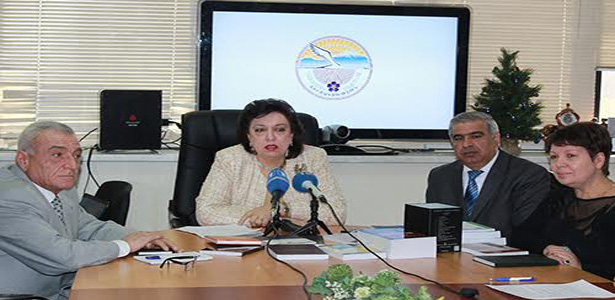RA Minister of Diaspora gives year-end press conference

On December 25, RA Minister of Diaspora Hranush Hakobyan gave a year-end press conference. During the press conference, the minister talked about the major activities that the RA Ministry of Diaspora had carried out in 2015. “The year 2015 was a very tense year and a year of many events. Most of our activities were devoted to the implementation of events dedicated to the Centennial of the Armenian Genocide, the integration of Syrian-Armenians, the solution to their problems, the preservation of the Armenian language and identity abroad, as well as our cooperation with pan-Armenian organizations. Thanks to the efforts of regional committees coordinating the events dedicated to the Centennial of the Armenian Genocide, today, we have created a strong platform for the consolidation of the Armenian people, and it is clear that the struggle will continue. All countries with Armenian populations were involved in those events. Thanks to the combined efforts of Armenians in Armenia and the Diaspora, many cities and countries recognized and condemned the Armenian Genocide and became more aware of the issue, and the Armenian nation became more united,” the minister mentioned.
The minister attached importance to the 13 forums, conferences, discussions and roundtable discussions that the RA Ministry of Diaspora held this year.
Talking about the programs for Syrian-Armenians’ integration, the minister mentioned that, by the assignment of the RA President, the RA Ministry of Diaspora created an Inter-Agency Commission for the Syrian-Armenians and coordinates the activities for the Syrian-Armenians. The objective of the RA Ministry of Diaspora is to help the Syrian-Armenians integrate quickly. They lost their jobs and homes, are under pressure, have domestic issues, are different in terms of culture and psychology, and it is the duty of the Ministry of Diaspora to show generosity towards them.
By cooperating with the Inter-Agency Commission on Coordination of Syrian-Armenians’ Issues and the Aleppo Compatriotic Charitable Organization, the Ministry of Diaspora tries to solve the Syrian-Armenians’ social issues, as well as issues related to education, healthcare, legislation and more. The minister informed that there are currently 17,000 Syrian-Armenians living in the Republic of Armenia, of which 1,800 are schoolchildren and 500 are students. Between 2012 and 2015, 12,000 Syrian-Armenians acquired citizenship of the Republic of Armenia, 1,650 obtained a residency status and 2,200 addressed the Ministry of Diaspora with the issues related to employment. To solve the issue of recruitment, the Ministry of Diaspora worked with 200 state and non-governmental organizations and individuals, and over 500 Syrian-Armenians have been hired by successful Syrian-Armenian small businessmen. Currently, various charitable organizations pay the rents for over 1,000 Syrian-Armenian families.”
Touching upon the issue of preservation of the Armenian language, the minister stressed the fact that the Armenian language was also subject to genocide and was cut from its roots 100 years ago. Today, in many Armenian communities of the Diaspora, Armenian is lagging, and there is a serious danger of assimilation. It’s not by chance that UNESCO has classified Western Armenian as one of the endangered languages. The minister attached importance to the programs and events that were held with the purpose of preserving the Armenian language and particularly mentioned the following:
“Through the “Ari Tun” Program, 1,103 young Armenians began each day by learning Armenian and taking courses devoted to Armenia and the Armenians. Many Diaspora Armenians participated in the Armenian language distance learning program of the AGBUArmenianVirtualUniversity. The Ministry of Diaspora, in association with the Calouste Gulbenkian Foundation, carries out programs to help raise the level of Western Armenian language proficiency. Through the H1 Armenian Public Television, the Armenian Language Programs created by the order of the Ministry of Diaspora have been aired for more than 40 hours, three times a week. Alongside the Eastern Armenian through English learning program, Eastern Armenian has also been taught to Russian-speaking Armenians via a TV language program. The Ministry of Diaspora has also helped open one-day schools in the Diaspora, especially in the CIS. This year, more than 20 Armenian schools were opened. In Batumi, the Ministry of Diaspora helped open the “Armenian Home” CulturalCenter after Alexander Mantashyan, which can help bring the members of the old Armenian community of Batumi together.
The RA Ministry of Diaspora has signed memoranda of and agreements on cooperation with various pan-Armenian organizations (Union of Armenians of Russia, the World Armenian Congress, Hamazkayin Armenian Educational and Cultural Society, Homenetmen, the Armenian Relief Society, the Calouste Gulbenkian Foundation and the Union of Volunteer Land Defenders NGO) through which it has carried out several programs and events for preservation of the Armenian identity.
The minister also touched upon the major cultural events held throughout the year and set aside the “100 Years-100 Armenian Costumes” concert/exhibition that showcased the works of Istanbul-Armenian artist Julia Mutlu.
The Ministry of Diaspora also organized the “We Sing Komitas” Pan-Armenian Festival, which brought together 300 Diaspora Armenian performers from 12 countries around the world.
In the end, the minister wished the attending journalists a Happy New Year and Christmas and wished that the year 2016 would bring peace to the world.




 Արևելահայերեն
Արևելահայերեն Արևմտահայերեն
Արևմտահայերեն Русский
Русский






